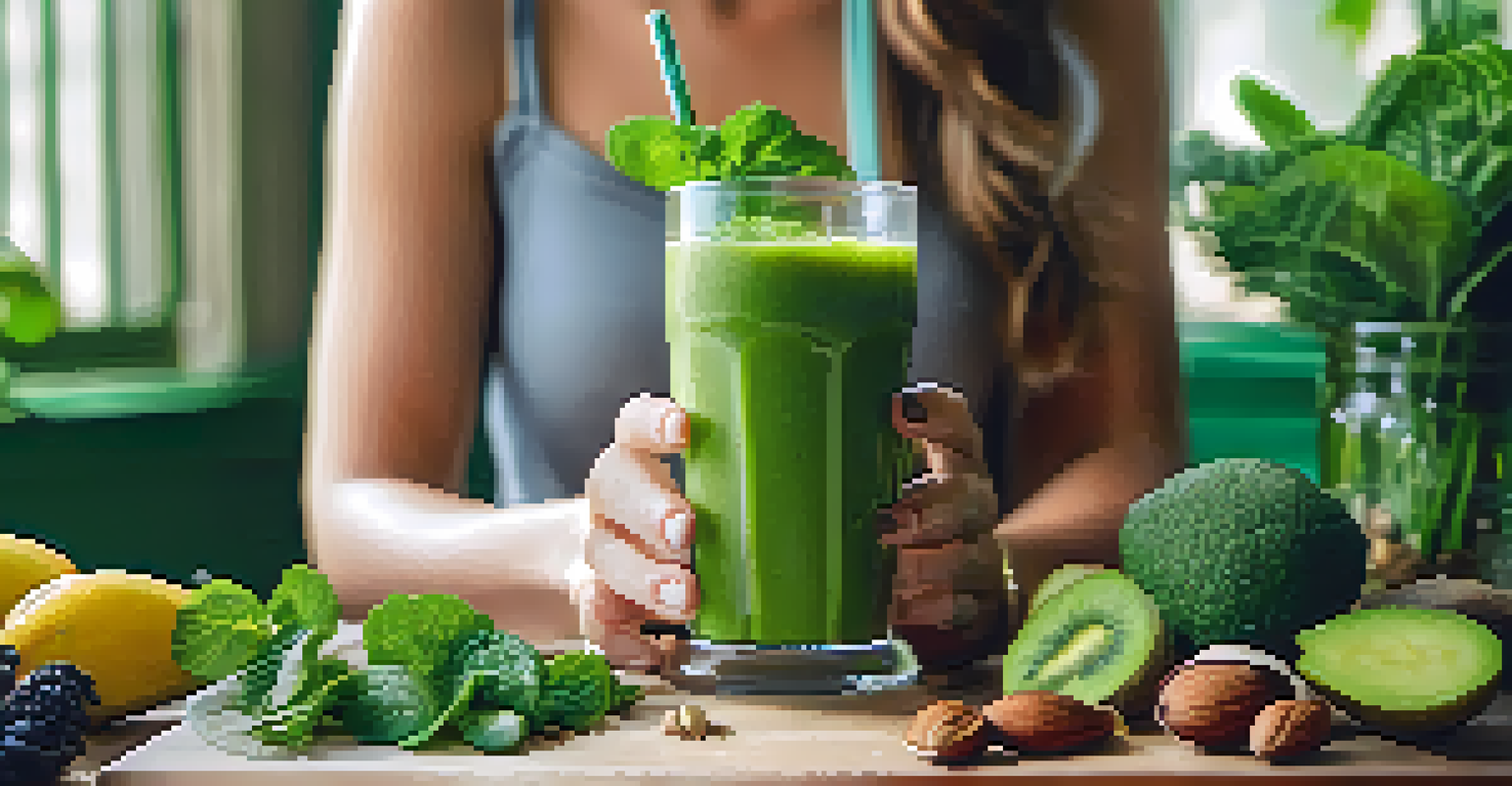Types of Nutritional Supplements for Raw Food Enthusiasts

Understanding Nutritional Gaps in a Raw Food Diet
A raw food diet can be incredibly healthy, but it may lack certain essential nutrients. Since raw food enthusiasts often avoid cooked foods, they might miss out on vitamins and minerals that are typically found in grains, legumes, and some cooked vegetables. This creates a nutritional gap that can lead to deficiencies if not addressed properly.
Let food be thy medicine and medicine be thy food.
For example, Vitamin B12 is predominantly found in animal products, making it a challenge for those on a strictly plant-based raw food diet. Without proper supplementation, a deficiency in this vitamin can lead to fatigue and neurological issues. Understanding these gaps helps raw food enthusiasts make informed choices about their nutritional needs.
Incorporating supplements can bridge these gaps effectively. This awareness encourages individuals to be proactive about their health, ensuring that their raw food journey is both enjoyable and nutritionally balanced.
The Importance of Omega-3 Fatty Acids
Omega-3 fatty acids are crucial for heart health and brain function, yet they are often underrepresented in a raw food diet. These healthy fats are typically sourced from fish, which raw food enthusiasts may avoid. Incorporating a supplement can ensure adequate intake of these essential nutrients.

One popular option is flaxseed oil, which is rich in alpha-linolenic acid (ALA), a type of omega-3. ALA can be converted by the body into the more beneficial EPA and DHA, although this conversion isn't very efficient. Thus, a supplement can help meet those omega-3 needs more directly.
Address Nutritional Gaps
Raw food diets can lack essential nutrients like Vitamin B12 and Omega-3 fatty acids, making supplementation important.
In addition to supporting heart health, omega-3s also have anti-inflammatory properties. This can be especially beneficial for those who engage in regular physical activity or are looking to manage inflammation in their bodies.
Vitamin B12: A Must-Have for Raw Foodists
Vitamin B12 is one of the most critical supplements for raw food enthusiasts. As mentioned earlier, B12 is primarily found in animal products, making it a challenge for those following a raw vegan diet. A deficiency can lead to serious health issues, including anemia and neurological damage.
You are what you eat, so don't be fast, cheap, easy, or fake.
Many raw food enthusiasts choose to supplement with B12 in the form of sublingual tablets or injections. These methods are effective in ensuring the body receives adequate amounts of this vital nutrient. It's an easy fix that can make a significant difference in overall health.
Regular testing and monitoring of B12 levels can help raw food enthusiasts maintain optimal health. Understanding the importance of this vitamin empowers individuals making dietary choices aligned with their lifestyle.
Iron and Zinc: Overcoming Plant-Based Challenges
Iron and zinc are two essential minerals that can be challenging to obtain from a raw food diet. While plant sources like spinach and nuts contain these minerals, they also come with phytates, which can hinder absorption. This is why supplementation may be necessary for those on a raw food diet.
Iron is vital for creating red blood cells and transporting oxygen throughout the body. For raw food enthusiasts, considering a supplement with ferrous gluconate or a plant-based iron source can be beneficial. Pairing these supplements with vitamin C-rich foods can enhance absorption.
Emphasize Probiotics for Gut Health
Incorporating probiotics can improve digestive health for raw food enthusiasts, particularly those experiencing fiber-related discomfort.
Zinc plays a crucial role in immune function and cellular metabolism. A supplement can help ensure adequate levels, especially for those avoiding animal products. By addressing these mineral needs, raw food enthusiasts can support their vitality and overall well-being.
Probiotics: Promoting Digestive Health Naturally
Probiotics are beneficial bacteria that support gut health, and they can be particularly useful for raw food enthusiasts. Since a raw diet is often high in fiber, it can sometimes lead to digestive discomfort. Supplements containing probiotics can help maintain a balanced gut microbiome and improve digestion.
Fermented foods like sauerkraut and kimchi are excellent natural sources of probiotics, but they may not always be a staple in a raw food diet. A daily probiotic supplement can help ensure you're getting enough of these beneficial bacteria, which can enhance nutrient absorption and boost immunity.
By incorporating probiotics into their routine, raw food enthusiasts can enjoy improved digestive health and a more balanced gut. This makes for a more enjoyable and sustainable dietary experience.
Vitamin D: The Sunshine Vitamin for Raw Food Lovers
Vitamin D is often referred to as the 'sunshine vitamin' because our bodies can produce it with sunlight exposure. However, for those following a raw food diet, especially in areas with limited sunlight, supplementation may be necessary. This vitamin is crucial for bone health and immune function.
Raw food enthusiasts should consider a vitamin D3 supplement, which is more effective than D2 in raising vitamin D levels in the blood. This is particularly important during the winter months or for those who spend most of their time indoors.
Select Quality Supplements
Choosing organic and non-GMO supplements ensures they align with the health-conscious values of raw food enthusiasts.
Additionally, certain raw foods like mushrooms can provide some vitamin D, but the levels are often insufficient. By choosing a quality supplement, raw food enthusiasts can help maintain their health year-round.
Choosing Quality Supplements: What to Look For
When selecting nutritional supplements, quality is key. Raw food enthusiasts should look for products that are organic, non-GMO, and free from artificial additives. This ensures that the supplements align with their health-conscious lifestyle and dietary preferences.
Reading labels and understanding ingredient sourcing can help consumers make informed choices. Third-party testing can also provide assurance that the supplements are safe and effective. Many reputable brands will share this information transparently.

Ultimately, choosing high-quality supplements can enhance the raw food experience. By ensuring that these products meet their standards, raw food enthusiasts can confidently support their health and well-being.